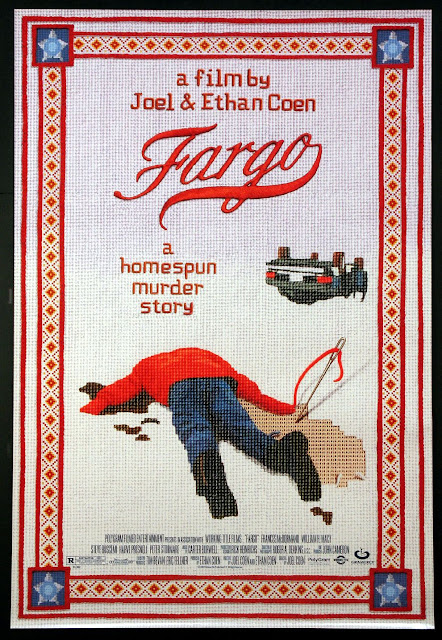Format: TCM
Viewing: Unknown
Decade: 1990's
Director: Joel Coen
God damn, this movie.
Like many, I loved (LOVED) Fargo when we saw it in the theater back in 1996, and I watched it several times in the years immediately following, but it's been a long stretch since I last watched it beginning to end. I was watching the final 20 minutes or so of Blood Simple on TCM, and Jamie suggested we record Fargo and watch it in a day or so, and as Jamie is wise, I was on board.
And, really, the two movies aren't a bad pairing.
Blood Simple - the Coens' first - is a horror-like noir with trappings of unfaithful wives, murder of lovers, which might have been in drawing rooms in the 1940's and is transplanted to suburban Texas (the greater Austin area) where it all takes on a sheen of low-fi, red neckiness. But it also is Texas mean - something we'd see repeated in their adaptation of No Country For Old Men.
Famously, Fargo (1996) takes place between Fargo, North Dakota and Minneapolis, Minnesota, with stops in Brainerd, Minnesota - and all in the whiteout dead of winter. The film exists in empty spaces, from the wide open plains of Brainerd to parking lots with a single car to lake fronts in winter. Minneapolis, with people huddled inside, has its own sense of emptiness. Even the spacious home of the Lundegaards has a kind of desolation.
Fargo has since been explored by Noah Hawley over four seasons of the TV series, none of which replicate the film, but delve into the film's ideas of the nature and types of evil in a world that could be so simple and has a few people out there at least trying to make sure justice is seen.
And, really, watching Fargo this time, that's all I could see. The window dressing of the accents is gone, I'm well versed in the cinematography Roger Deakins brought to the movie. But this time, I was looking at the mindless horrorshow of Peter Stomare's psychopathic Gaear Grimsgud, the shrill self-centeredness of Buscemi's Carl Showalter, the dead-eyed American Businessman of Wade Guftason, and even the whiny callowness of Jerry Lundegaard's son.
Of course, Jerry's own failures as a human are so large, they aren't contained within the scope of the film. We don't know why he needs the money that he's seeking in his kidnapping scheme. We don't know what he's done with the money he's taken the loans for. He was at the end of his rope before the movie even began. He may be an everyman, but I'm not sure what that says about every man as he's finally hauled off by cops in his briefs in the dead of winter.
It's tempting to write a whole post on Mike Yanagita - maybe one of the oddest and most memorable scenes in any Coen Bros movie. But Mike is a reminder that not everyone is in control of the bad things they do, but they do them, and they lie about them still. Only Peter Stomare's character wouldn't bother to lie.
These people lead complicated, messy lives, where they can't tell the truth to their spouses, where they use their wives as pawns in their own schemes. All of it in comparison to Marge and Norm Gunderson, uncomplicated to a fault.
Look, you can easily spend 40,000 words talking about the movie, what it does, why, how it does it, how it mixes comedy and drama.
Every once in a while watching a Coen Bros movie now, and I don't watch them all that often, I'm hit with emotion that I didn't maybe get in my younger years when I watched for the aesthetic, for the oddball nature of one of their films. But a few years ago, I found myself almost bawling at the end of O Brother, Where Art Thou? in the final scene with George Clooney returned home to his family. And here, when Marge is driving a post-wood-chipper Gaear back to Brainerd, her brief monolog to him just hit me like a two-by-four to the gut.
So, that was Mrs. Lundegaard on the floor in there. And I guess that was your accomplice in the wood chipper. And those three people in Brainerd. And for what? For a little bit of money? There's more to life than a little money, you know. Don'tcha know that? And here ya are, and it's a beautiful day. Well. I just don't understand it.
All the chaos of the film. All the deaths left in the wake of a few people with money issues. And there's no need. You could have made it a beautiful day.


No comments:
Post a Comment